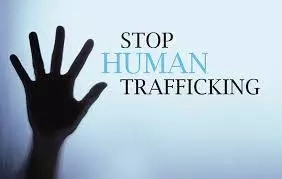Human Trafficking in Nigeria; Meaning, Causes, Effects, Possible Solutions
Human Trafficking in Nigeria
In this post, we discuss Human trafficking in Nigeria. Here you will see the meaning of Human trafficking, notable cases, causes, effects and possible solutions to the menace. This article is useful to curious learners, students, researchers, and policymakers.
Human trafficking is the trade of humans for the purpose of commercial sexual exploitation/slavery, forced labour, forced marriage, rituals, etcetera.
👉 Relocate to Canada Today!
Live, Study and Work in Canada. No Payment is Required! Hurry Now click here to Apply >> Immigrate to CanadaIt is also called trafficking in persons, especially women and children, and may occur within a country or transnationally. It is a crime against the person, as it violates the person’s rights to life and movement.
Read Also: 5 security operations ongoing to deal with bandits, kidnappers: FG

Human trafficking is one of the fastest-growing activities of transnational criminal organizations. In Nigeria, women and children are subjected to trafficking for the purpose of forced labour and forced prostitution.
The nation is a transit and destination country for human traffickers. Women and girls are taken for the purpose of commercial sexual exploitation/slavery, and domestic servitude.
While, boys are taken for the purpose of begging, mining, and domestic servitude. Women and children are taken from within the country’s borders and taken to other West African and Central African countries like Gabon, Benin, Togo, Niger, Burkina Faso, Gambia, and Chad, as well as other European countries like Russia and Italy, and other the Middle East and North African countries.
Also, children from other West African nations like Togo, Ghana, and the Benin Republic are brought to Nigeria and forced to work tedious jobs in inhumane conditions.
Recently, in 2017, the U.S. State Department’s Office to Monitor and Combat Trafficking in Persons placed the country in “Tier 2 Watchlist.” Also,
according to the United Nations Education, Scientific, and Cultural Organization(UNESCO), Nigeria was said to be one of the leading African countries as regards trafficking in persons, both within and outside its borders.
👉 Relocate to Canada Today!
Live, Study and Work in Canada. No Payment is Required! Hurry Now click here to Apply >> Immigrate to CanadaHuman trafficking continues to be a way to escape the high poverty and unemployment rate in the nation, with the country being one of the poorest nations in the world, with a very low per capita GNP.
It is estimated that over 15 million Nigerians leave outside the country for the purpose of education, jobs, as well as other illicit activities like commercial sex work.
European nations, like Spain and Italy, are the major target of those fleeing the nation, and recently, it was discovered that Italy has the highest population of Nigerian’s victimized by human trafficking, with over 20,000 women and girls found to be prostituting on the streets of Italy.
Also, in 2014, a recent report on human trafficking revealed that over 170, 000 arrived in Italy by sea in that year alone, and the numbers continue to increase sporadically.
Read Also: Head of Buhari’s Daura district kidnapped
Causes of human trafficking in Nigeria
Human trafficking in Nigeria is caused by a number of reasons, ranging from poverty to unemployment and illiteracy.
The harsh economic conditions in the country make some individuals jump at any opportunity to move to greener pastures, and human traffickers deceitfully provide these opportunities.
Most people are unaware of the harsh conditions that trafficked persons are subjected to, and so, quickly agree to the terms of human traffickers.
And, even when they are aware, they still agree to these terms because of the promise of greener pastures. Greed, war, and political conditions can also lead to human trafficking. Below are some of the causes of human trafficking:
1. Poverty
Poverty is one of the major causes of human trafficking in today’s world. Underdeveloped countries, mainly third world countries like Nigeria, are more prone to trafficking in person’s because the lack of development and infrastructure leads their citizens to seek greener pastures elsewhere, and so, they’ll easily fall prey to human traffickers.
No individual likes to live in harsh living conditions, where his basic needs cannot be met, and so any promise of a better life is quickly grabbed with both hands.
2. Unemployment
Unemployment and a lack of job opportunities, like poverty, can quickly lead one into the deceptive hands of human traffickers.
In many third world countries like Nigeria, where unemployment rates are high, and job opportunities are scarce, human traffickers come to the citizens of these nations and woo them with promises of steady paying jobs and a better life in European countries, and these citizens are deceived by these promises and are won over.
Eventually, they’re trafficked to European countries and face harsher conditions than they did in their own countries.
3. Greed
Greed, the unquenchable desire for wealth at any cost, no matter how immoral, is also another cause of human trafficking.
Most human traffickers are driven by greed and do not care how they amass wealth, even if another human being’s right are violated as a result.
Also, trafficked persons may also be influenced by greed, and as such, would do anything to “make it” in life, even going as far as selling their bodies as sex workers in European countries.
Family members also driven by greed could influence the younger ones in the family, especially the young girls, to go outside the shores of the country and engage in illicit acts in order to make money.
Some family members may even sell the younger ones under their care to human traffickers without their consent.
Read Also: Armed kidnappers attack community, kill 2, kidnap 3
4. Illiteracy
Lack of formal education and exposure sometimes makes individuals easily susceptible to the deceit of human traffickers.
When a person doesn’t know better, it is quite easy to deceive such a person. And, so, most times, human traffickers play on the illiteracy and ignorance of individuals, and thus, deceives them into being trafficked. It is why individuals in underdeveloped areas are more prone to being trafficked.
5. War and Conflict
Citizens of countries plagued by violent conflict, most times, seek to escape the tension boiling in their nations, and human traffickers play on this and provide opportunities for these citizens to flee from these conflicts.
Also, in most nations ridden by insurgency and terrorism like Nigeria, terrorist groups might abduct women and children during raids and attacks, and these women and children are subjected to inhumane jobs in terrorist camps like sex slavery, and could sometimes be commercially sold to other human traffickers.
Effects of human trafficking in Nigeria
Human trafficking has adverse effects on the individual and nations involved. The individual is exposed to the risk of sexually transmitted diseases and infections, and, worst-case scenario, death.
There are also adverse effects on the population of the countries involved. The countries where these young women and children are taken to begins to experience overpopulation, as the immigration rate increases.
Below are some of the adverse effects of overpopulation:
1. Sexually transmitted diseases and infections
Women and girls trafficked to European nations are forced to engage in illicit commercial sex, and so are exposed to all forms of sexually transmitted diseases and infections.
They’re subjected to harsh inhumane working conditions, as sometimes, in a day, they’re made to engage in sexual activities with a countless number of men.
Majority of these men, sometimes, refuse to use protection on these women and girls, and this carelessness results in STDs and STIs.
2. Psychological trauma
The inhumane conditions that trafficked persons are subjected to leads to mental, emotional and psychological trauma.
Women and girls forced to engage in illicit sexual activities suffer from low self-esteem because of the activities they’re made to carry out, and their mental health becomes affected as a result.
3. Harsh effects on population growth
Human trafficking has harsh adverse effects on the population growth of European countries where trafficked persons are taken to.
Trafficked persons are smuggled into these European countries as illegal immigrants, and not as registered citizens, and thus, there’s an increase in population growth, and this eventually affects a country’s development.
The crime rate is also affected, as most illegal immigrants smuggled into these European countries engage in illegal activities to make ends meet.
4. Stigmatization
Stigmatization is another adverse effect of human trafficking. When most trafficked persons return home after the harsh experiences they faced in European nations, they face an even harsher stigma back in their home country, as they’re quickly branded as shameful and disgraceful.
This stigma affects, adversely, their already depleting mental and emotional state, and worsens their psychological trauma.
Read Also: 5 traffic robbery suspects in police net
Possible solutions to the menace of human trafficking
The federal government of Nigeria has continued to put in an effort to combat the menace of human trafficking, especially with the establishment of Anti-trafficking organization like the National Agency for the Prohibition of Trafficking in Person’s (NAPTIP) – whose public enlightenment unit works in rural areas of Benue, Kogi, and Edo States, introducing grassroots programs, and even holding an annual race against human trafficking, with the first edition in Edo State, in 2009, with 5,000 runners – and the Women Trafficking and Child Labour Eradication Foundation (WOTCLEF). Also, in 2015, Develop a center for Africa development partnered with NAPTIP to educate over 5000 women, teenagers, educators and youths on how to prevent trafficking in persons.
Over 120 women, youth, educators, law enforcement, legal practitioners, media professionals, health caregivers, and community volunteers were trained between July 2015 to May 2016 from 6 states in Nigeria.
These and many other commendable efforts have been taken to prevent trafficking in persons. However, despite the commendable efforts taken to prevent human trafficking, more still has to be done to intensify the battle against the menace.
First, and most important, is the development of the country by the federal government in terms of infrastructure, job creation, and poverty alleviation.
A country ridden by unemployment and poverty cannot successfully shake off the menace of human trafficking. Citizens are attracted out of their home country because of a lack of opportunities, opportunities that present themselves elsewhere.
Therefore, if Nigeria is to successfully combat human trafficking, the federal government must make Nigeria attractive again to its citizens.
The federal government should also reinforce laws and protocols that protect individuals, especially women and teenage girls, from the risk of being trafficked across the country’s borders to outside nations to be used as commercial sex/domestic slaves.
Law enforcement agencies like The Nigeria customs service, The Nigerian police force, and The Nigerian immigration service should provide organizations like NAPTIP with relevant intelligence to help prohibit individuals from being trafficked across the nation’s borders.
The media and the general public should also provide relevant information regarding the illegal activity of human traffickers to the appropriate agencies.
Also, the Federal government should put in an extra intensive effort to ensure the return and rehabilitation of person’s that have been forced outside the country through the illegal activities of human traffickers.
Also, programmes should be put in place by relevant authorities to educate the public on human trafficking and its dangers.
Read Also: Nigeria, Niger to work together to stamp out human trafficking
Conclusion
Human trafficking is a terrible menace to a nation and must be snuffed out quickly. Poverty, unemployment, illiteracy, and security challenges are some of the national issues that lead to trafficking in person’s, and these issues must be tackled if human trafficking is to be dealt with.
Appropriate agencies should also put in considerable effort to combat the threat. The general public is not left out as well. Has this article been helpful? Let us know.




